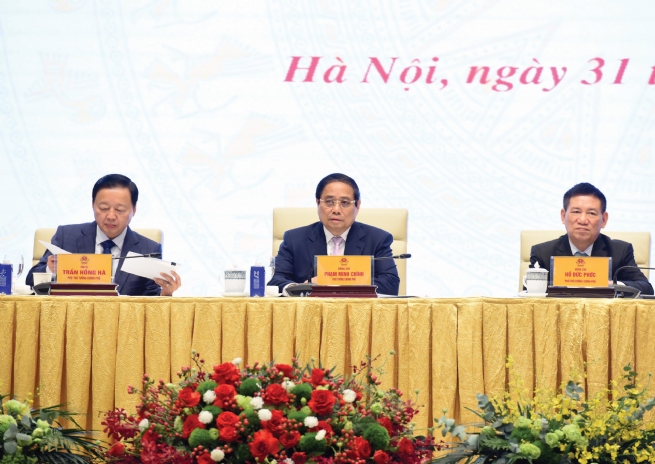10:21:21 AM | 6/10/2025
The recently promulgated Resolution 68-NQ/TW by the Politburo on private sector development, known as Resolution 68, marks a historic turning point in promoting the private sector as a key driver of Vietnam’s national economy.

Party General Secretary To Lam and other Party and State leaders visit an exhibition showcasing achievements of the private economy
The resolution has garnered strong support from the business community, experts and local governments, with high hopes that it will ignite a renewed spirit of innovation, creativity and global integration, steering Vietnam into a new era of prosperous development.
Private sector development: A long-term strategy
Resolution 68 affirms that the rapid, sustainable and effective development of the private sector is both an urgent task and a long-term strategic objective. According to Dr. Vo Tri Thanh, Director of the Institute for Brand and Competitiveness Strategy, this is the first time the Politburo has explicitly emphasized the central role of the private sector, backed by a strong political commitment: the State will act as a facilitator and enterprises will serve as the engine of growth.
“The private sector currently contributes more than 50% of GDP. To achieve the target of 8% GDP growth by 2025 and beyond that, double-digit growth, the private sector is indispensable,” Thanh noted.
Resolution 68 is seen as the third major breakthrough in Vietnam’s private sector development journey, after its official recognition in 1988 - 1990 and the Enterprise Law’s enactment in 1999 - 2000. This latest move focuses on improving the quality of the private sector, ensuring equal access to resources and business opportunities.
The resolution calls for the elimination of discriminatory practices among economic sectors, with specific solutions to be institutionalized. Violations will be strictly dealt with to ensure a transparent and fair business environment. This not only addresses immediate challenges but also reinforces the private sector's long-term role alongside the public sector.
Driving implementation at the local level
From a local perspective, Nguyen Khac Hieu, Vice Chairman of the Vinh Phuc Provincial People’s Committee, emphasized that Resolution 68 has fostered broad consensus among the province’s business community. Vinh Phuc has identified the private sector as a core engine of growth, with targeted initiatives such as transparent planning, acceleration of key projects, administrative reforms and digital transformation.
“The spirit of Resolution 68 has been integrated into our socio-economic development plan for the 2021–2025 period, with a vision toward 2045. We are enhancing dialogue with enterprises, particularly in high-tech industries, supporting industries and green urban development,” Hieu shared.
The province has also assigned specific targets to departments and sectors to boost budget revenues and promote cultural and social development, laying a solid foundation for sustainable growth.

Prime Minister Pham Minh Chinh and Deputy Prime Ministers Tran Hong Ha and Ho Duc Phoc chair a dialogue on implementing the Politburo’s Resolution 68-NQ/TW on private economic development
Fueling entrepreneurial aspiration
Hoang Duc Thao, Chairman of the Vietnam Association of Science and Technology Enterprises, described Resolution 68 as a catalyst that awakens national pride and entrepreneurial will for innovation. “The resolution conveys a clear message: private enterprises must take initiative, build resilience and lead the market economy,” Thao emphasized.
To realize this vision, he proposed the development of a synchronized institutional framework, access to affordable capital, a digitized payment system, and preferential policies on taxation and land use. “Private enterprises are facing intense market and competitive pressures. The government must provide targeted support, particularly in the form of corporate and personal income tax incentives and dedicated land allocations,” he added.
Dau Anh Tuan, Deputy Secretary General of the Vietnam Chamber of Commerce and Industry (VCCI), highlighted that Resolution 68 is not only a political statement but a legal revolution. Its most groundbreaking element is the dismantling of longstanding prejudices against the private sector, recognizing it as the most important engine of the national economy. Specific policies such as a three-year tax exemption, the removal of business license fees, and the clear distinction between individual and corporate liability in economic violations have been especially welcomed by businesses.
“Prioritizing administrative and civil remedies before criminal proceedings significantly reduces legal risks, creating a safer and more internationally aligned business environment,” Tuan noted. The resolution also addresses key bottlenecks in capital and land access. Private enterprises will gain access to loans assessed on cash flow viability instead of asset-based collateral requirements and will have access to dedicated land plots within industrial zones. The national land database, expected to be completed by 2025, will enhance transparency in transactions and lower the cost of resource access.
On the technological front, Resolution 68 continues to offer tax incentives, allowing businesses to deduct up to 200% of eligible R&D expenses from taxable income, helping private enterprises boost competitiveness in the global value chain.
Toward a target of 3 million enterprises by 2045
Resolution 68 sets ambitious targets: two million registered enterprises by 2030 and three million by 2045, up from the current figure of approximately 960,000 businesses and five million household enterprises. According to Tuan, with business-friendly tax policies and simplified procedures, many household businesses are expected to transition into formal enterprises, creating millions of jobs and expanding the national revenue base.
To achieve these goals, the government has already begun drafting detailed guiding decrees, underscoring its determination to implement the resolution effectively. However, Tuan stressed: “We must shift from a mindset of control to one of facilitation. Nationwide consensus from central to local levels will enable the private sector to soar.”
Resolution 68 is no longer just a policy on paper; it is being translated into concrete actions. Guiding decrees have been submitted to the National Assembly, and local authorities are actively implementing coordinated plans. This transformation is fostering strong confidence that the private sector will become a key pillar in building a prosperous, innovative and globally integrated Vietnam.
|
Resolution 68 paves the way for private sector expansion in Vietnam
Pham Tan Cong, President of the Vietnam Chamber of Commerce and Industry (VCCI) I believe that Resolution 68-NQ/TW, recently signed and promulgated by Party General Secretary To Lam on behalf of the Politburo, marks a strategic breakthrough, opening up immense development opportunities for the private sector. This is a long-awaited resolution by the business community - not only for its substantive content but also for its symbolic significance. It serves as a powerful push and an inspiring message to entrepreneurs and the wider society. What stands out most in this resolution is the formal recognition of the private sector as the most important driving force in the national economy. It represents a clear, direct and strong acknowledgment by the Party of the contributions and development potential of private enterprises. The resolution outlines a comprehensive set of strategic solutions - from institutional reform and improvements to the business and investment environment, to financial mechanisms, human resource development, and the promotion of innovation. We can all clearly see that after nearly 40 years of renovation; there is an abundant pool of resources among the population that has yet to be effectively harnessed. The rise in savings deposits and the public’s tendency to invest in gold, USD or real estate suggests that capital is not being channeled efficiently into production and business. I firmly believe that Resolution 68 will be a crucial tool in unlocking these resources, removing obstacles and creating momentum for the private sector to break through. Another highly encouraging aspect of the resolution is its emphasis on building a safe, healthy business environment that refrains from criminalizing normal economic relations. This is something that entrepreneurs have long been waiting for, so they can confidently invest for the long term, innovate, and contribute more significantly to the economy. However, for the resolution to truly take root in real life, implementation is key. Translating its guiding principles into concrete policies and actions is a heavy but vital task, requiring strong engagement from the entire political system - especially at the grassroots level. As the representative body for the business community, VCCI will take the initiative to act as a bridge between the Party, the State, and the business sector. We will continue to intensify efforts to improve the business environment, promptly communicate the difficulties and obstacles encountered during policy implementation, and contribute to building a dynamic, transparent, and efficient business ecosystem. I am confident that if Resolution 68 is implemented decisively and comprehensively, it will generate a new wave of development in the private sector and help propel Vietnam’s economy into a period of sustainable and breakthrough growth in the near future. |
By Huong Ly, Vietnam Business Forum